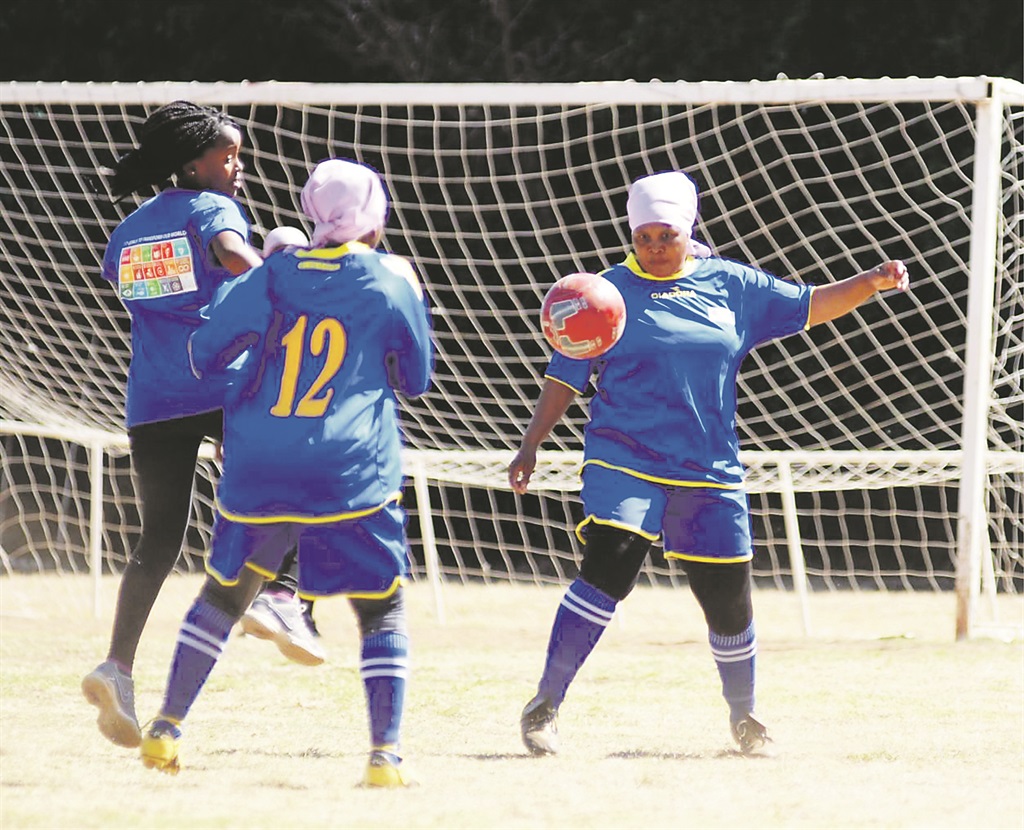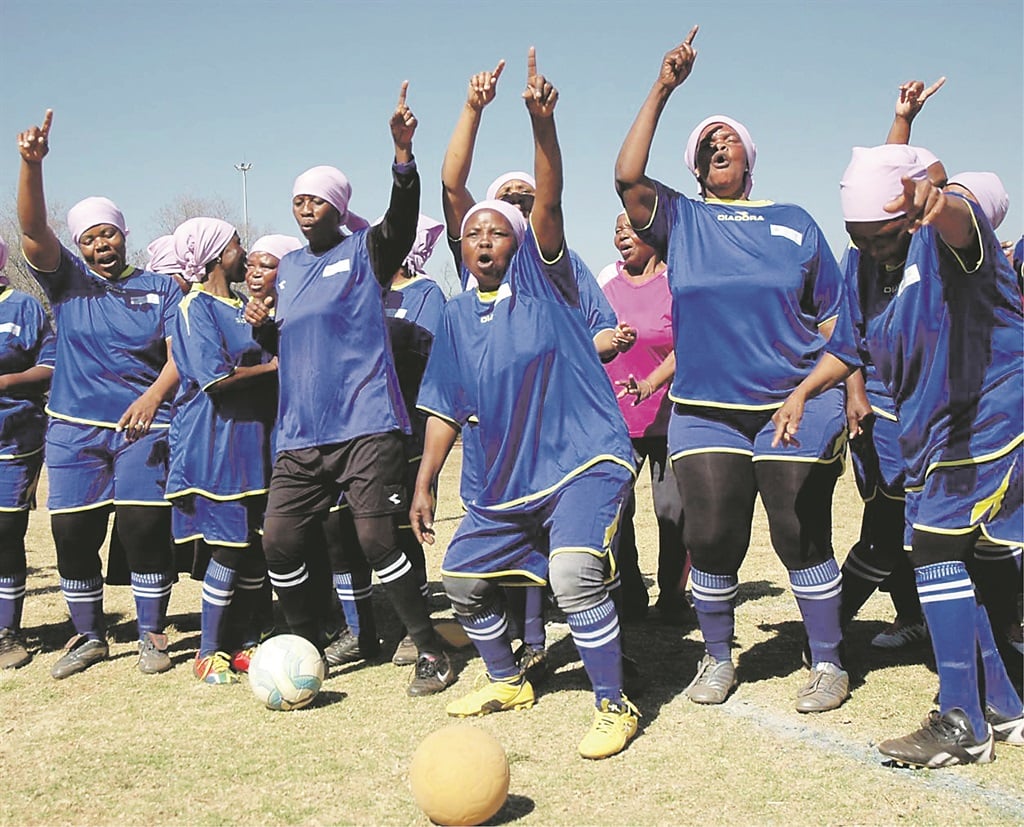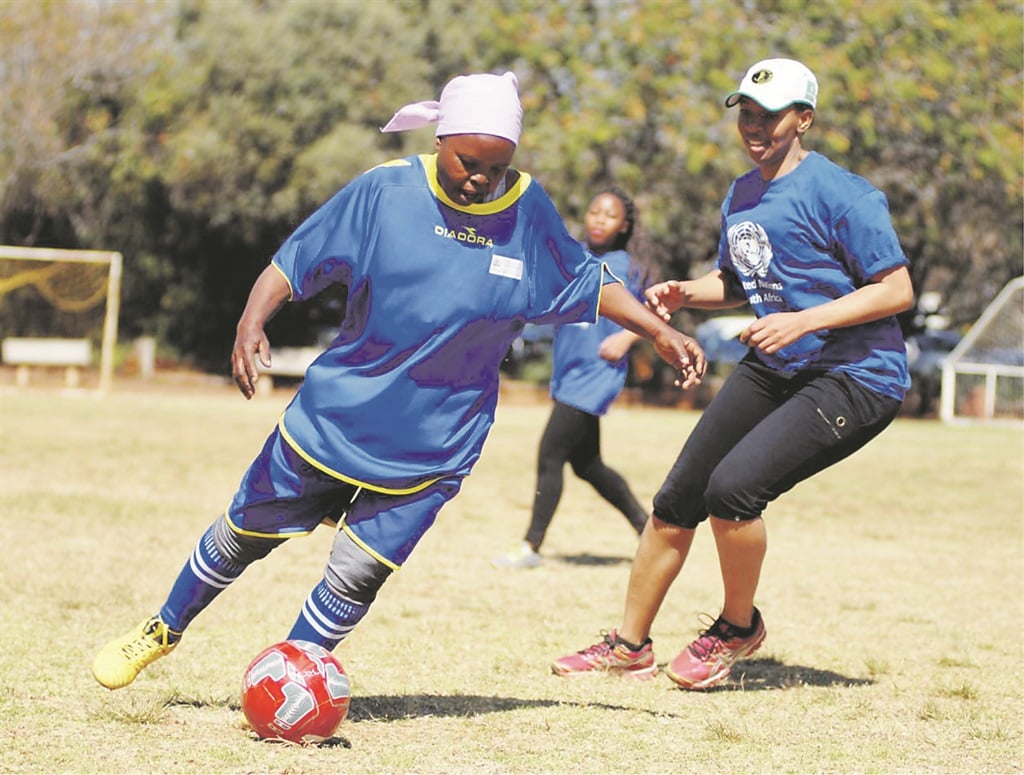It is not every day that a soccer team takes on their opponents with pink headscarves, black tights and ululation – ailments and aching joints be damned.
But Vakhegula Vakhegula FC is not your everyday football club as most of its players are 65 and over, not to mention that one of the few men in sight is its young coach.
Since it was first formed in 2005, the club that took its name from the Xitsonga for “Grannies Grannies” has become somewhat of a phenomenon, putting its spirited sputlas (short people) through their paces for the sake of soccer, but more so for the good that these age-defying gogos derive from the beautiful game.
The club’s founder, Beka Ntsanwisi, who is in her forties but is called “Mama Beka” by most of the much-older players, says it began when she was diagnosed with colon cancer in 2003.
Doctors suggested a lifestyle change by taking part in rudimentary exercise, which helped her on the road to remission.
A long-standing community worker who in 2008 was awarded the Order of Baobab for her work in providing everything from houses to bursaries and burials, Ntsanwisi started spreading the good news of exercising among Tzaneen’s legions of cabin-fevered grannies.
“They were just sitting at home, looking after orphans or the abandoned children of their teenage granddaughters, and battling bad health on top of it all.”
One day Ntsanwisi persuaded two of her elderly friends to join her in a park in her home village of Nkowankowa for a bit of aerobics, when a soccer ball crossed their path.
She never would have thought that a simple misdirected dribble would get the ball rolling for what eventually would become Vakhegula Vakhegula.
“There were these boys who kicked the ball to us and one of the grannies went after it. They shouted, ‘Run granny run!’, but when she kicked the ball she missed.”
Ntsanwisi told film maker Lara-Ann de Wet, who has received widespread acclaim for her documentary Alive & Kicking, which is about the club: “Another granny tried to kick the ball and also missed.
“We just laughed.”
When Ntsanwisi called her friends the next day to head back to the park, they agreed, but not for aerobics. “No, no, no!
“We want more of this thing [soccer]. It’s nice!”
As soon as word got out about the soccer-playing grannies, more and more elderly women – not all are grannies – joined, swelling the fledgling club’s membership.
Apart from a lack of proper gear, transport to other clubs, and other shortcomings, Vakhegula Vakhegula’s members faced gossip and derision from their community.
Says Ntsanwisi: “Women are [traditionally] not supposed to wear shorts, let alone run around and kick a ball.
“But the way the grannies would fall around, playing soccer in skirts, soon persuaded them to try shorts with tights underneath.”
Although they are scorned in some circles, the grannies nevertheless don headscarves as a sign of respect and an increasing number of men are beginning to doff the proverbial cap to the verve and vitality of the taboo-busting gogos.
Ntsanwisi says getting out and having fun has become a lifesaver for many of the grannies.
“Coming out to play is a treat for them. It lifts their mood and helps their bodies heal.
“The overall message of seizing life through soccer certainly has caught on.”
Vakhegula Vakhegula now has 13 different teams, one being “completely white”, and the club’s oldest player, Gabaza Mathevula, who is 86, “is still playing”.
In 2010 a gathering of grannies went to the US to play in the Veterans Cup, and in 2014 Coca-Cola sponsored 13 of them to go to Brazil for Fifa’s football spectacle.
“We stayed in the same hotel as Lionel Messi,” Ntsanwisi beams.
Interestingly, that’s what some of the grannies are called these days, “Messi” or “Ronaldo”, when they walk down the streets of Nkowankowa.
Of course it’s all very funny, but it’s also quite serious.
Ntsanwisi, through her community foundation, is doing a lot of awareness coaching among teenagers, reminding them that grannies aren’t just there to look after unwanted children.
It has even caused the UN to step up and take notice.
At a recent event hosted at the CSIR in Pretoria, the Vakhegula Vakhegula were again out in full force, making do with the barest of resources.
Once they emerged from dressing behind a minibus taxi, followed first by a little breakfast, they were ready to hit the turf, often literally.
Their opponents, Team Refugee, cobbled together from much younger stock as part of the UN’s He for She campaign, had a clear upper hand over the never-say-die grannies.
Even a winning goal, dubiously awarded in the dying minutes of the match, couldn’t stop the grannies from picking themselves up and dusting themselves off, smiling as they high-fived each other.
“Next time bring your mothers so we can play against people of our own age group,” one of the gogos joked.
- This article forms part of the How To Spread It series, in which City Press and the Southern Africa Trust profile African philanthropy.
According to Beka Ntsanwisi, the founder of Vakhegula Vakhegula Football Club, there are five essential components and boxes to tick before staring a football club for grannies:
1. Most importantly, prospective players must consult general practitioners to get the all-clear from a health point of view. Know what your limitations are, adapt your play accordingly, and don’t exert yourself if you have a serious cardiovascular condition. If you get injured, stop playing and allow your body to heal.
2. Play with your peers. It’s generally not a good idea to have people in their seventies and older play against people in their sixties or younger.
3. Passion and commitment are important for progress. Once you start, persist, because the longer you stay active, the more you’ll feel the effects of sustained fitness.
4. Consider working through an existing club. They already have personnel, infrastructure and related systems and services in place.
5. Get in touch with a fundraiser (such as Mama Beka herself) to help with getting the ball rolling for your soccer club for grannies.




 Publications
Publications
 Partners
Partners











